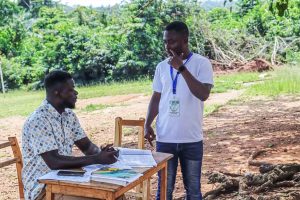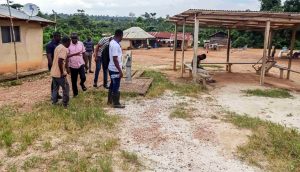
In the quest for gold, the true treasure of knowledge is too often left buried, as many deprived communities across Ghana, especially within mining areas, are facing increasing challenges that force them to trade classrooms for gold pans.

In the Atiwa West District of the Eastern Region, the lack of educational infrastructure, learning materials and motivation is pushing schoolchildren into illegal mining, commonly known as galamsey.
This came to light when As I Grow, a non-governmental organisation, led by its Chief Executive Officer (CEO), Mr. Debrah Bekoe Isaac, paid a working visit to three (3) schools in the district, to find out the challenges confronting the educational ecosystem.
The three schools are Abomosu Presby Basic School, Abresu Wekpeti D/A Basic School and Abrenya R/C Basic School.
Management members of the NGO, which is committed to alleviating poverty and supporting rural children, were surprised when they found out that the lack of educational opportunities in these communities is devastating.
During the visit, the NGO engaged students, community leaders and residents, uncovering stories of children skipping school not out of choice, but necessity.
It was discovered that some children simply cannot attend school because they lack basic supplies like textbooks, exercise books, pens, uniforms or even shoes, whilst others are drawn into galamsey because it offers quick money and their parents, struggling to survive, often support this decision.
Inadequate Classrooms, Unsafe Roads and Abandoned Dreams
In both Abresu Wekpeti and Abrenya, kindergarten and lower primary, students are cramped into shared classrooms, creating a chaotic learning environment with teachers struggling to deliver lessons and losing interest in pursuing education.

Even worse, mobility to school has become a serious issue as the dilapidated bridge over the Birim River, leading to Abrenya is dangerous and unreliable, especially in the rainy season where the river overflows, cutting off access entirely.
“When the river floods, education stops. Teachers cannot cross and students are stranded,” some community members shared.
Faced with these challenges, many children are turning to illegal mining activities, with parents, many of whom have lost faith in the education system or lack awareness of its value, allowing or even encouraging their children to join them at mining sites.
As a result, education is increasingly side-lined with its long-term dire consequences. Not only is the region witnessing an educational crisis, but there is also a moral decline, with rising teenage pregnancies and youth delinquency reported.
A Cry for Help from the Communities
During the NGO’s visit, local leaders pleaded for support not just for their schools, but for their entire communities.
They expressed key concerns such as lack of clean water (no boreholes), absence of toilets or social centers, poor road infrastructure, especially in Abrenya, the collapsed bridge on the Birim River and farmlands destroyed by illegal mining.
They appealed to the government and stakeholders to address these pressing issues which are crippling both their economy and children’s future.
A Call to Action
Mr. Debrah Bekoe Isaac stressed that without urgent intervention, the children of Atiwa West face a bleak future, adding that “these children are not lazy, rather they are simply neglected. If they had proper classrooms, textbooks and uniforms, many would choose school over galamsey”.
He called on government agencies, NGOs, philanthropists and individuals to support rural education and development.
His outfit pledged to provide some educational materials, including exercise books, writing supplies and uniforms, as part of its efforts to reinvigorate learning in these areas.
He also urged parents to prioritise education, save from their farming income and guide their children away from dangerous mining activities.
The As I Grow CEO was of the view that the situation in Atiwa West was a reflection of a broader rural crisis and without immediate support and sustainable interventions many more children will continue to leave classrooms for the allure of illegal mining.








